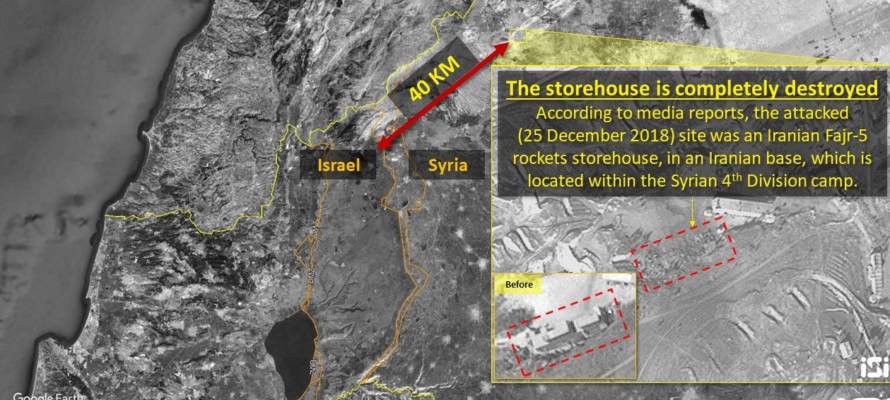An Israeli official confirmed on Wednesday that IAF airstrikes in Syria destroyed an Iranian facility, with satellite photos confirming the statement.
By Associated Press and United with Israel Staff
An Israeli security official on Wednesday confirmed responsibility for overnight airstrikes in Syria, saying the air force had hit a series of targets involved in Iranian arms transfers to the Hezbollah terror group.
Satellite images taken on Wednesday and published by ImageSat International (ISI) on Thursday reveal just how devastating the airstrike was, showing a huge storage facility leveled to the ground.
The photos show the remnants of an 8,000 square foot Iranian warehouse at a Syrian army base near Damascus, explained ISI.
While Israel in the past has refused to comment on such strikes, it confirmed this year that it has carried out hundreds of these operations in the last two years, targeting Iranian personnel and military assets.
The Israeli official who confirmed the most recent strike said the air force attacked several Iranian targets in three main locations late Tuesday and early Wednesday. He said the targets were primarily storage and logistics facilities used by archenemy Iran to ship weapons to Hezbollah, an Iranian-backed Islamic terror group that fought Israel in a 2006 war.
The Israeli official said it Syrian air defenses endangered civilian planes during the incident by firing 30 missiles in response to the airstrike. He also claimed that Iranian forces are operating less than 80 kilometers (50 miles) from the Israeli border, contrary to Russian assurances.
The official spoke on condition of anonymity under standard Israeli security protocols. The military has not commented on the incident.
The official also said the Israeli jets hit all their targets, in some cases causing secondary explosions. He said they also destroyed a Syrian anti-aircraft battery.
The Britain-based Syrian Observatory for Human Rights, a war monitor, said Tuesday’s Israeli strike targeted three positions south of Damascus that are arms depots for Hezbollah and Iranian forces.
Israel battles Iran in Syria
Prime Minister Benjamin Netanyahu has repeatedly said Israel will not allow Iran to establish a permanent military presence in postwar Syria.
That mission has been complicated by the Sept. 17 downing of a Russian reconnaissance aircraft by Syrian fire. Russia, which also backs Syrian dictator Bashar Assad, has blamed Israel for the friendly-fire mishap and reportedly scaled back a hotline that allowed the two air forces to coordinate and avoid unintended clashes.
Russia also sent Syria sophisticated S-300 anti-aircraft missiles, though the Israeli official said an older system was fired at the Israeli planes in Wednesday’s incident.
Speaking at a military ceremony Wednesday, Netanyahu said the U.S. recently announced troop withdrawal from Syria will not change his policy.
Although he did not directly mention the airstrikes, he said Israel’s air force has unmatched capabilities and can reach areas “near and far, very far.”
“We are not prepared to accept the Iranian military entrenchment in Syria, which is directed against us. We will act against it vigorously and continuously, including during the current period,” he told a graduation ceremony of new air force pilots.
Addressing the same ceremony, Israel’s military chief, Lt. Gen. Gadi Eizenkot, praised the army’s “many important accomplishments,” including “thwarting the expansion of Iranian influence.”
